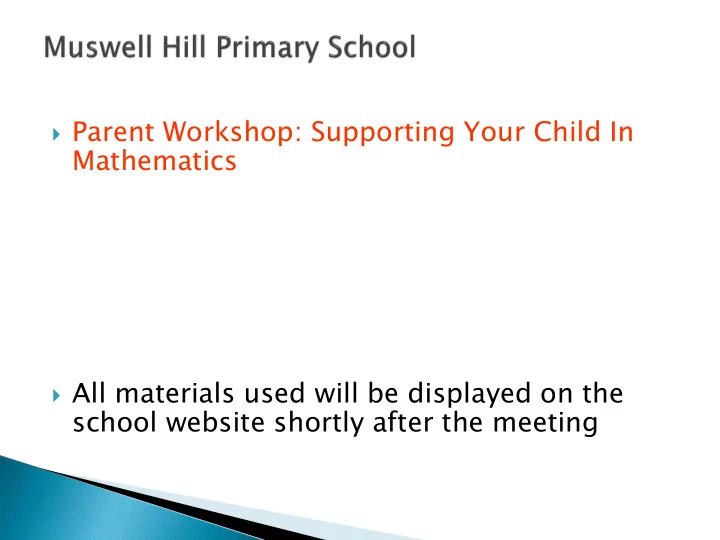

Parent Workshop: Supporting Your Child In Mathematics All materials used will be displayed on the school website shortly after the meeting
James Wiltshire Headteacher – Muswell Hill Primary School
What would be most useful? What are the challenges in supporting at home?
To develop understanding of ‘ expectation in calculation .’ To develop understanding of the strategies involved in multiplication. To develop understanding of how to support at home. Please see the MHPS calculation policy for further details: http://muswellhillprimary.co.uk/wp- content/uploads/2014/01/Mathematics- Calculation-Policy.pdf
The debate Multiplication: expectations in KS1 Multiplication: strategies for teaching in KS1 Multiplication: supporting you Reflection and questions
Can you do a calculation without doing any part of it mentally?
52 + 7 17 + 33 150 + 50 190 + 95 19 + 37 2007 – 998 =
“The ability to calculate mentally using a range of strategies is recognised as the basis of being numerate.” Derek Haylock His book is: Mathematics Explained for Primary Teachers
“Make it clear that there is no ‘proper’ way of doing mental calculation and that an effective mental or informal method is as valid as a formal written method.”
“…this does not mean of course that they do not write anything down…” They may need to write the question so they don’t forget it. They may write a few jottings (key information.) Support with a picture or numberline
Expecta ctati tion on by En End Of Y2 Example le – where here neces cessary ary The Standard – Mental Maths: Count in 2’s, 5’s and 10’s. See the next slides Multiplication facts for 2,5 and 10 Up to 2 x 12, 5 x 12 and 10 x 12 times tables. Know the corresponding division 2 x 6 = 12. 12 divided by 6 = 2 facts for 2,5 and 10 times tables. Understand that multiplication is 4 x 5 = 20 and 20 divided by 4 = 5 commutative but that division is 5 x 4 = 20 but 4 divided by 20 is not. not 5 Count in 10 from any number. 13, 23, 33, 43, 53… Click here… Number Grid ITP
Fizz Objective: To understand multiples of 5
Fizz, Buzz Objective: To understand multiples of 5 and 3
Expecta ctati tion on by En End Of Y2 Example le – where here neces cessary ary Calculate doubles of all numbers to Double: 1,2,3,4,5 etc 10 then 20 Double: 11, 17, 19 etc Know halves of all even numbers to Halve: 4,6,8,10 etc 10 and 20 Halve: 14,18, 20 etc Know odd and even numbers to 20 Odd: 17, 15, 19 and then 100 Even: 12, 14, 8 Odd: 77, 65, 43 Even: 24, 66, 44
Expecta ctati tion on by En End Of Y2 Example le – where here neces cessary ary Double multiples of 5 and 10 Double 25, Double 60 Halve any multiple of 10 up 100 Halve 90, Halve 30. Partition double tens and ones Double 21 separately then recombine Double 20 = 40. Double 1 = 2 Recombine: 40 + 2 = 42 Doubling is equivalent to Double 20 = 40 multiplying by 2. 20 x 2 = 40.
Number Spinners
Number dials
To develop understanding of ‘ expectation in calculation .’ To develop understanding of the strategies involved in addition and multiplication. To develop understanding of how to support at home.
Unfortunately we did not have enough time to complete the session. The next date will be emailed to parents/carers.
Recommend
More recommend